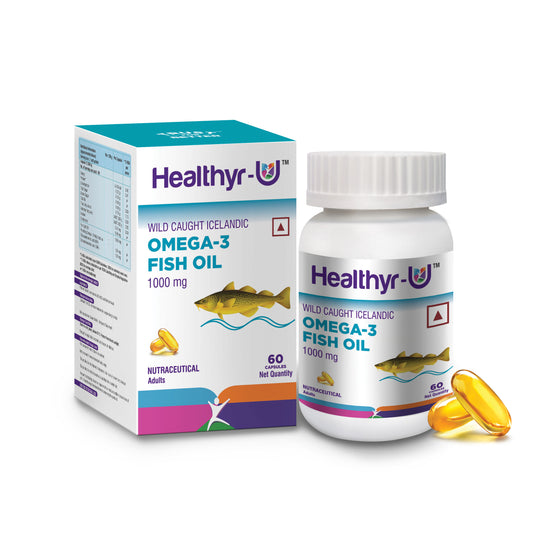In the fast-paced world we live in, maintaining optimal health requires more than eating right and exercising. A strong wellness routine demands the right nutritional support, and one supplement that has stood the test of time is Icelandic fish oil. Sourced from the pristine waters of Icelandic fish, Icelandic pure fish oil is redefining how people incorporate omega-3 fatty acids into their daily lives.
With scientifically backed fish oil benefits, including improved heart health, brain function, and joint support, Icelandic fish oil is becoming a game-changer in modern wellness routines.
But what sets it apart from other omega-3 fish oils?
Let us uncover the health benefits of fish oil and why Icelandic fish oil capsules are setting a new standard for purity and effectiveness.
What Makes Icelandic Fish Oil Special?
Not all fish oils are created equal. The quality of omega-3 fish oils largely depends on the source, processing method, and purity levels. Icelandic pure fish oil is derived from some of the cleanest waters on Earth, making it one of the purest and most effective sources of Omega-3 fatty acids.
• Sourced from Wild-Caught Iceland Fishes: Iceland is known for its rich marine biodiversity, where fish such as cod, herring, and mackerel thrive in cold, nutrient-dense waters. These species are naturally high in omega-3 fatty acids, making them ideal for fish oil extraction.
• Sustainably Harvested: Unlike some fish oils, Icelandic fish oil is extracted using environmentally responsible practices to ensure long-term sustainability.
• Molecularly Distilled for Purity: Icelandic pure fish oil undergoes molecular distillation, a process that removes heavy metals, toxins, and contaminants, ensuring a high level of purity.
These factors contribute to making Icelandic fish oil one of the most trusted and effective omega-3 fish oils available today.
Omega-3 Fish Oil Benefits: Why You Should Add It to Your Wellness Routine?
Omega-3 fatty acids are essential for overall health, but many people don’t get enough from their diet. Supplementing with Icelandic fish oil can provide a convenient and highly absorbable source of these vital nutrients.
Here is how it enhances wellness:
1. Supports Heart Health
One of the most well-researched benefits of fish oil is its ability to support cardiovascular health. Omega-3s play a key role in reducing risk factors for heart disease, such as lowering triglyceride levels, reducing blood pressure, improving blood circulation, and preventing plaque buildup in arteries(1).
People who consume omega-3 fish oils regularly have a lower risk of heart disease and stroke, making Icelandic fish oil a must-have for those prioritizing cardiovascular wellness.
2. Enhances Brain Function and Mental Clarity
Brain health is another area where omega-3 fatty acids shine. The human brain is made up of nearly 60% fat, and DHA (docosahexaenoic acid), a type of omega-3, is a primary structural component of brain tissue(11).
• Improves Memory and Cognitive Function: Regular intake of Icelandic pure fish oil has been linked to improved focus, sharper memory, and enhanced cognitive abilities(2).
• Reduces Risk of Cognitive Decline: Studies show that Omega-3s can help reduce the risk of neurodegenerative diseases, including Alzheimer’s(3).
• Manages Mood and Anxiety: Omega-3 fatty acids support the production of neurotransmitters like serotonin and dopamine, which play a role in mental well-being(4).
Adding Icelandic fish oil to your wellness routine is a natural way to support long-term brain health.
3. Reduces Inflammation and Supports Joint Health
Chronic inflammation is linked to numerous health issues, including arthritis, autoimmune diseases, and metabolic disorders. Omega-3 fish oil benefits include its ability to reduce inflammation and support overall joint health.
• Eases Joint Pain: Icelandic fish oil contains anti-inflammatory properties that help relieve stiffness and discomfort in the joints, making it beneficial for individuals with arthritis(5).
• Improves Flexibility and Mobility: The lubricating effect of omega-3s keeps joints flexible and reduces the risk of cartilage degradation(6).
For those who suffer from joint pain, Icelandic pure fish oil can be a natural way to support movement and reduce discomfort.
4. Supports Eye Health
Good vision depends on healthy retinas, which require adequate levels of DHA. Omega-3 fatty acids play a crucial role in maintaining eye function and reducing the risk of age-related eye conditions such as macular degeneration.
• Protects Against Dry Eyes: Fish oil supplementation can prevent dry eye syndrome by improving tear production and eye lubrication(7).
• Reduces Risk of Vision Loss: Studies suggest that omega-3 fish oils may help slow the progression of age-related macular degeneration, a leading cause of blindness(8).
5. Aids in Weight Management
Among the lesser-known health benefits of fish oil is its role in weight management. While omega-3 fatty acids don’t directly burn fat, they support metabolic function and improve body composition in several ways:
• Boosts Fat Metabolism: Omega-3s enhance the body's ability to break down and utilize fat efficiently(9).
• Supports Muscle Recovery: Omega-3s reduce muscle soreness and improve post-exercise recovery, making it easier to maintain a regular fitness routine(10).
For those focusing on weight management, Icelandic pure fish oil can be a great addition to their wellness routine.
Tips to Incorporate Icelandic Fish Oil into Your Daily Wellness Routine
Adding Icelandic fish oil to your diet is simple and highly effective. Here are the best ways to take it for maximum benefits:
• Capsules for Convenience: Taking fish oil capsules is the easiest way to get your daily dose of omega-3 fish oils without any unpleasant taste.
• Liquid Form for Maximum Absorption: If you prefer, you can take Icelandic fish oil in liquid form and mix it with smoothies or salad dressings.
• Pair with Meals: To improve absorption, take your omega-3 fatty acids supplement with meals containing healthy fats.
• Consistency is Key: Regular use is necessary to experience the full health benefits of fish oil, so make it part of your daily routine.
Conclusion
Icelandic fish oil is more than just another supplement, it is a scientifically backed powerhouse of omega-3 fish oil benefits that can transform your wellness routine. Whether the goal is to improve heart health, boost brain function, support joint flexibility, or enhance metabolic health, Icelandic pure fish oil offers a pure and sustainable way to achieve your health goals.
By incorporating omega-3 fatty acids into your daily regimen, you are investing in long-term wellness with one of nature’s most effective health solutions. Make the switch today and experience the superior fish oil benefits that Icelandic fish oil capsules provide.
References
- Khan, S. U., Lone, A. N., Khan, M. S., Virani, S. S., Blumenthal, R. S., Nasir, K., Miller, M., Michos, E. D., Ballantyne, C. M., Boden, W. E., & Bhatt, D. L. (2021). Effect of omega-3 fatty acids on cardiovascular outcomes: A systematic review and meta-analysis. EClinicalMedicine, 38, 100997. https://doi.org/10.1016/j.eclinm.2021.100997
- Dighriri, I. M., Alsubaie, A. M., Hakami, F. M., Hamithi, D. M., Alshekh, M. M., Khobrani, F. A., Dalak, F. E., Hakami, A. A., Alsueaadi, E. H., Alsaawi, L. S., Alshammari, S. F., Alqahtani, A. S., Alawi, I. A., Aljuaid, A. A., & Tawhari, M. Q. (2022). Effects of omega-3 polyunsaturated fatty acids on brain functions: a systematic review. Cureus. https://doi.org/10.7759/cureus.30091
- Cole, G. M., Ma, Q., & Frautschy, S. A. (2009b). Omega-3 fatty acids and dementia. Prostaglandins Leukotrienes and Essential Fatty Acids, 81(2–3), 213–221. https://doi.org/10.1016/j.plefa.2009.05.015
- Healy-Stoffel, M., & Levant, B. (2018). N-3 (Omega-3) fatty acids: effects on brain dopamine systems and potential role in the etiology and treatment of neuropsychiatric disorders. CNS & Neurological Disorders - Drug Targets, 17(3), 216–232. https://doi.org/10.2174/1871527317666180412153612
- Goldberg, R. J., & Katz, J. (2007). A meta-analysis of the analgesic effects of omega-3 polyunsaturated fatty acid supplementation for inflammatory joint pain. Pain, 129(1), 210–223. https://doi.org/10.1016/j.pain.2007.01.020
- Shawl, M., Geetha, T., Burnett, D., & Babu, J. (2024). Omega-3 supplementation and its effects on osteoarthritis. Nutrients, 16(11), 1650. https://doi.org/10.3390/nu16111650
- Wang, W., & Ko, M. (2023). Efficacy of omega-3 intake in Managing Dry Eye Disease: A Systematic Review and Meta-Analysis of Randomized Controlled Trials. Journal of Clinical Medicine, 12(22), 7026. https://doi.org/10.3390/jcm12227026
- Fan, H., & Song, J. (2022). Potential mechanisms of macular degeneration protection by fatty fish consumption. Current Opinion in Pharmacology, 63, 102186. https://doi.org/10.1016/j.coph.2022.102186
- Damaiyanti, D. W., Tsai, Z., Masbuchin, A. N., Huang, C., & Liu, P. (2023). Interplay between fish oil, obesity and cardiometabolic diabetes. Journal of the Formosan Medical Association, 122(7), 528–539. https://doi.org/10.1016/j.jfma.2023.03.013
- VanDusseldorp, T. A., Escobar, K. A., Johnson, K. E., Stratton, M. T., Moriarty, T., Kerksick, C. M., Mangine, G. T., Holmes, A. J., Lee, M., Endito, M. R., & Mermier, C. M. (2020). Impact of varying dosages of fish oil on recovery and soreness following eccentric exercise. Nutrients, 12(8), 2246. https://doi.org/10.3390/nu12082246
- Chang CY, Ke DS, Chen JY. Essential fatty acids and human brain. Acta Neurol Taiwan. 2009 Dec;18(4):231-41. PMID: 20329590.









